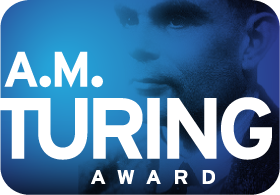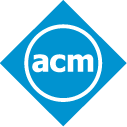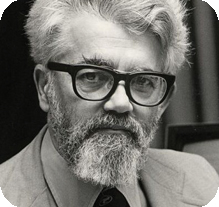
A.M. TURING AWARD WINNERS BY...
John McCarthy

United States – 1971
Short Annotated Bibliography
- Levin, Michael, Lisp 1.5 Programmers Manual, MIT Press, Cambridge, Massachusetts, 1965. The classic manual for the most widely used programming language for artificial intelligence research.
- Lifschitz, Vladimir (ed.), Artificial Intelligence and Mathematical Theory of Computation, Papers in Honor of John McCarthy, Academic Press, San Diego, 1991. Covers much of John McCarthy’s pioneering research.
- McCarthy, John, M.L. Minsky, N. Rochester and C.E. Shannon, “A proposal for the Dartmouth summer conference on artificial intelligence” Conference Announcement for the seminal meeting on AI, 31 Aug. 1955.
- McCarthy, John, “Programs with Common Sense,” Proceedings of the Teddington Conference on the Mechanization of Thought Processes, 1958. His earliest work on getting computers to reason like people.
- McCarthy, John, “A Time Sharing Operator Program for our Projected IBM 709”, Memorandum to Professor P.M. Morse, Jan. 1, 1959. This memo initiated the development of timesharing systems.
- McCarthy, John, et al, “Thor—a display based time sharing system,” Proceedings of the AFIPS Conference, 1967. The first display-based general purpose timesharing system.
- McCarthy, John. “The Home Information Terminal.” Man and Computer, Proceedings of the International Conference, Bordeaux, 1970, pp. 48-57, Karger, Basel, 1972. Anticipated the usefulness of computer access from the home, much of which would not be realized until the appearance of networked personal computers in the early 1980s.
- McCarthy, John, Edward Feigenbaum, Joshua Lederberg, “The first ten years of artificial intelligence research at Stanford,” Computer Science Department Report STAN-74-409, Stanford University, July 1973. Reviews the diverse set of projects that found a home in SAIL.
- McCarthy, John. “Applications of Circumscription to Formalizing Common Sense Knowledge,” Artificial Intelligence, April 1986. A key development in formalized common sense reasoning.
- McCarthy, John and Vladimir Lifschitz (ed.), Formalization of Common Sense, papers by John McCarthy, Ablex, Norwood, New Jersey, 1990. More on common sense reasoning.
- Shannon, Claude and John McCarthy (eds.), Automata Studies, Princeton: Princeton University Press, 1956. McCarthy’s first large work on what he later called artificial intelligence.




























 THE A.M. TURING AWARD
THE A.M. TURING AWARD